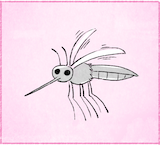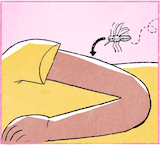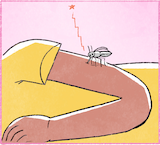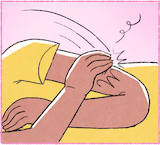



นี้คืออี่หยัง นี้คือญุง
ญุงมันเป็นสัดมีปีก ญุงมันบ่มีกะดูก ญุงมันบินได้ เพาะว่ามันมีปีก
แต่ว่าญุงเป็นสัดน้อยๆ บ่สามาดอยู่ได้โดน สามาดใซ้ซีวิดได้แค่เจ็ดมื้อ แล้วมันกะตาย
ญุงมันกินเลียดเป็นอาหาน มันสิกินเลียดคน หลือกินเลียดสัดอื่นๆ ขั้นมันบ่ได้กินเลียด มันกะสิตายเล็ว
มันกัดเจ็บบ่ เจ็บอยู่ ญุงมันกัดเจ็บหลาย ขั้นมันมากัดเฮา มันกะสิเจ็บบักคักหนึ่ง
ญุงมันตาย้านบ่ ตาย้านอยู่ ขั้นญุงมันกัดเฮา เฮากะอาดสิเป็นโลกไข้เลือดออกกะได้ โลกนี้มันตาย้านหลาย
11
ญุงมันกำลังเฮ็ดหญัง มันกำลังสิบินไปกัดคน มันสิบินไปกัดแขนคน
พุซายคนนี้ เขาใส่เสี้ยแขนสั้น กำลังนอนหลับอยู่
ญุงมันเห็น มันกะเลยสิไปกัดกินเลียด กัดกินเลียดของคน ตอนนี้มันกำลังสิบินไป เบิ่งซงแล้วมันคือสิอยากกินเลียดหลาย อยากกัดคนหลาย
12
ตอนนี้ญุงมันเฮ็ดอี่หยัง ตอนนี้ญุงมันกำลังกัดคน
มันบินลงไปกัดคนแล้ว ตอนนี้มันกัดคนอยู่ มันกำลังกินเลียด ตอนนี้คนบ่ทันได้ฮู้สึก คนกะกำลังนอนอยู่
13
เขากำลังเฮ็ดหญัง เขาฮู้สึกโต เขาฮู้สึกเจ็บ เพาะว่าญุงกำลังกัดเขา เขากะเลยใซ้มือของเขาตบญุง
ขั้นเขาตบญุง ญุงสิตายบ่ กะตายอยู่ เพาะว่าเขาใซ้มือของเขาตบญุง ขั้นมันโดนคนตบ มันกะสิตาย
Link to overview page
Link to dictionary
| Isaan | Pronunciation | Tones | Thai | English/Notes |
|---|---|---|---|---|
| นี้ | ni: | HF | นี้ | 1. this 2. here |
| คือ | khʉ: | HR | คือ | 1. to be, to resemble, like, as 2. why {บักหล้าคือบ่เก็บโต่ะแน่ = [addressing a young boy] Why haven't you cleared the table?} |
| อี่หยัง | i:-yaŋ | H-M | อะไร | 1. what {นี้คืออี่หยัง = What is this?} {มื้อนี้เจ้าเฮ็ดอี่หยัง = What are you doing today?} {กินเข้างายกับอี่หยัง = What did you have for breakfast?} 2. something, anything, (in negations) nothing {บ่ต้องเฮ็ดอี่หยังอีกเลยนอกจากใส่ปุย = [we] don't need to do anything besides adding fertilizer} |
| ญุง | ɲuŋ | HR | ยุง | mosquito |
| มัน | man | HR | มัน | it (also used to refer to people) |
| เป็น | pen | M | เป็น | 1. to be, to exist 2. to be able to 3. to suffer, sth. happens to 4. เป็นหญัง[...]คือ in initial position: why? {เป็นหญังเขากะคือแปงฟัน = Why is he brushing his teeth?} {เป็นหญังเคี่ยงบินมันคือสิตก = Why is the airplane falling down?} |
| สัด | sat | M | สัตว์ | animal |
| มี | mi: | HR | มี | 1. to have 2. there is |
| ปีก | pi:k | LF | ปีก | wing |
| บ่ | bɔ: | H | ไม่ | 1. no, not 2. question particle, transforming a statement into a question Notes: spelling exception in line with common usage on social media |
| กะดูก | ga-du:k | M-LF | กระดูก | bone |
| บิน | bin | M | บิน | to fly |
| ได้ | dai | HF | ได้ | 1. can 2. to get, to obtain 3. before verb: indicating past tense 4. บ่ได้ + verb: not |
| เพาะว่า | phɔ-wa: | H-H | เพราะว่า | because |
| แต่ว่า | tɛ:-wa: | H-H | แต่ว่า | 1. but 2. only {ฮู้แต่ว่าเขายืนอยู่พุเดียว = I only know that he's standing there by himself} |
| น้อย | nɔ:i | HF | น้อย | 1. few, little 2. small |
| สามาด | sa:-ma:t | M-HF | สามารถ | can, to be able |
| อยู่ | yu: | H | อยู่ | 1. to be (located) at 2. yet, still 3. auxiliary indicating continuous or progressive action {ทอดปาอยู่ในกะทะ = (in the process of) frying a fish in the pan} {แม่กำลังเมี้ยนเฮียนอยู่ = mother is cleaning/tidying up the house} |
| โดน | do:n | M | นาน | time: long |
| ใซ้ซีวิด | sai-si:-wit | HF-HR-H | ใช้ชีวิต | to live, to spend one's life |
| แค่ | khɛ: | H | แค่ | only |
| เจ็ด | jet | M | เจ็ด | seven |
| มื้อ | mʉ: | HF | วัน | day |
| แล้ว | lɛ:o | HF | แล้ว | 1. finished 2. already 3. and then, and next (especially แล้วกะ) 4. auxiliary for past tense |
| กะ | ga | M | ก็ | 1. then, consequently 2. also |
| ตาย | ta:i | M | ตาย | to die |
| กิน | gin | M | กิน | to eat, to consume, to use |
| เลียด | li:at | HF | เลือด | blood Notes: pronunciation: also realized as เลือด |
| อาหาน | a:-ha:n | M-M | อาหาร | food {ญุงมันกินเลียดเป็นอาหาน = the mosquito feeds on blood} |
| สิ | si | M | จะ | future tense auxiliary {เขากำลังสิตื่น = he's about to wake up} {สิไปตะหลาด = [I'm] going to the market} |
| คน | khon | HR | คน | person, people |
| หลือ | lʉ: | M | หรือ | or |
| อื่น | ʉ:n | H | อื่น | other |
| ขั้น | khan | LF | เมื่อ | when, if |
| เล็ว | leo | HR | เร็ว | fast, quick |
| กัด | gat | M | กัด | to bite |
| เจ็บ | jep | M | เจ็บ | painful, to hurt |
| หลาย | la:i | M | เยอะ, มาก | many, much, very |
| มา | ma: | HR | มา | 1. to come 2. auxiliary expressing action towards the present or focal time {กะคุเฮ็ดมาจากอี่หยัง = What is the bucket made of?} {แล้วเขากะเก็บเงินจากพุนั้นมา = and then she takes the money of that person} |
| เฮา | hao | HR | เรา | 1. personal pronoun: we 2. personal pronoun: I |
| บักคักหนึ่ง | bak-khak-nʉŋ | M-H-H | intensifier: very, very much (variant of คัก) | |
| ตาย้าน | ta:-ya:n | M-HF | น่ากลัว | scary, not safe |
| อาด | a:t | LF | อาจ | 1. might, may, will 2. likely |
| โลก | lo:k | HF | โรค | disease, illness |
| ไข้เลือดออก | khai-lʉ:at-ɔ:k | LF-HF-LF | ไข้เลือดออก | dengue fever Notes: the vowel เอือ is likely to be a Thai loan |
| กำลัง | gam-laŋ | M-HR | กำลัง | auxiliary indicating continuous or progressive action |
| เฮ็ด | het | H | ทำ | to do, to make |
| หญัง | ɲaŋ | M | อะไร, เป็นหญัง = ทำไม | 1. what {เขากำลังเฮ็ดหญัง = What is he doing?} {ธูปเอาไว้เฮ็ดหญัง = What are incense sticks for?} 2. something, anything, (nothing) 3. เป็นหญัง[...]คือ in initial position: why {เป็นหญังเขาคือใส่บักพิกลงไปในกวยเตียว = Why is he putting chili in [his] noodle soup?} {เป็นหญังหน้าต่างมันคือเปิด = Why is the window open?} {เป็นหญังมันคือมีควนไฟ = Why is there smoke?} |
| ไป | pai | M | ไป | 1. to go 2. auxiliary indicating action extending into the future |
| แขน | khɛ:n | M | แขน | arm |
| พุซาย | phu-sa:i | H-HR | ผู้ชาย | man, male |
| เขา | khao | M | เขา | personal pronoun: he, she |
| ใส่ | sai | H | ใส่ | 1. to put something in/on {เขาใส่บักพิกในกวยเตียวหลาย = he's putting a lot of chili in his noodle soup} {เขาบีบยาสีฟันใส่แปงสีฟัน = he squeezes toothpaste on the toothbrush} {ก่องเอาไว้ใส่ของ = boxes are there to put stuff in} 2. to wear (clothes) {เขาใส่เสี้ยแขนญาว = he's wearing a long-sleeve} 3. directed at {เอิ้นใส่กัน = to call each other/to say to each other} {หมามันเห่าใส่แมว = the dog barks at the cat} {ล้องเพงใส่ไม = to sing into the microphone} {เขากำลังซี้มือไปใส่พุซาย = she's pointing at the man} |
| เสี้ย | si:a | LF | เสื้อ | shirt |
| สั้น | san | LF | สั้น | short |
| นอนหลับ | nɔ:n-lap | HR-M | นอนหลับ | to sleep |
| เห็น | hen | M | เห็น | to see |
| เลย | lə:i | HR | เลย | 1. futher on, beyond, past {เข็มน้อยเลยเลขสิบสองไป = the minute hand has passed number twelve} 2. too much 3. at all 4. definitively 5. completely, utterly |
| ของ | khɔ:ŋ | M | ของ | of, belonging to |
| ตอนนี้ | tɔ:n-ni: | M-HF | ตอนนี้ | now |
| เบิ่ง | bəŋ | H | ดู | 1. to look at, to see, to watch {เบิ่งโทละทัด = to watch TV} {เบิ่งหนัง = to watch a movie} 2. to guess {เบิ่งซงแล้ว ... = [I] guess / from what it looks like ...} |
| ซง | soŋ | HR | ทรง | 1. shape, form 2. as if, like Notes: translation to be confirmed |
| อยาก | ya:k | LF | อยาก | to want, to wish |
| ลง | loŋ | HR | ลง | 1. to descend, to lower, to go down 2. down 3. bus/train etc.: to get off, to disembark {คนกำลังลงลดบั่ด = people are getting off the bus} 4. boat/ship etc.: to get on, to board {เขากำลังญ่างลงเลีย = he's boarding/getting on the boat} |
| บ่ทันได้ | bɔ:-than-dai | H-HR-HF | ยังไม่ได้ | not, not yet {บ่ทันได้กินเข้า = [I] haven't eaten yet} {อายุบ่ทันได้หลาย = not yet old} {เขาอาดสิบ่ทันได้เถ้ากะได้ = maybe he's not yet (that) old} Notes: see also ทันได้ which is apparently equivalent |
| ฮู้สึก | hu:-sʉk | HF-M | รู้สึก | to feel, to sense Notes: see also ลู้สึก |
| นอน | nɔ:n | HR | นอน | 1. to lie down 2. to sleep |
| ฮู้สึกโต | hu:-sʉk-to: | HF-M-M | รู้สึกตัว | to become aware of, to become conscious of |
| ใซ้ | sai | HF | ใช้ | to use |
| มือ | mʉ: | HR | มือ | 1. hand 2. front leg/paw (e.g., of a cat) |
| ตบ | top | M | ตบ | 1. to hit with the palm 2. to slap, to pat, to swat |
| โดน | do:n | M | โดน | marker for passive |